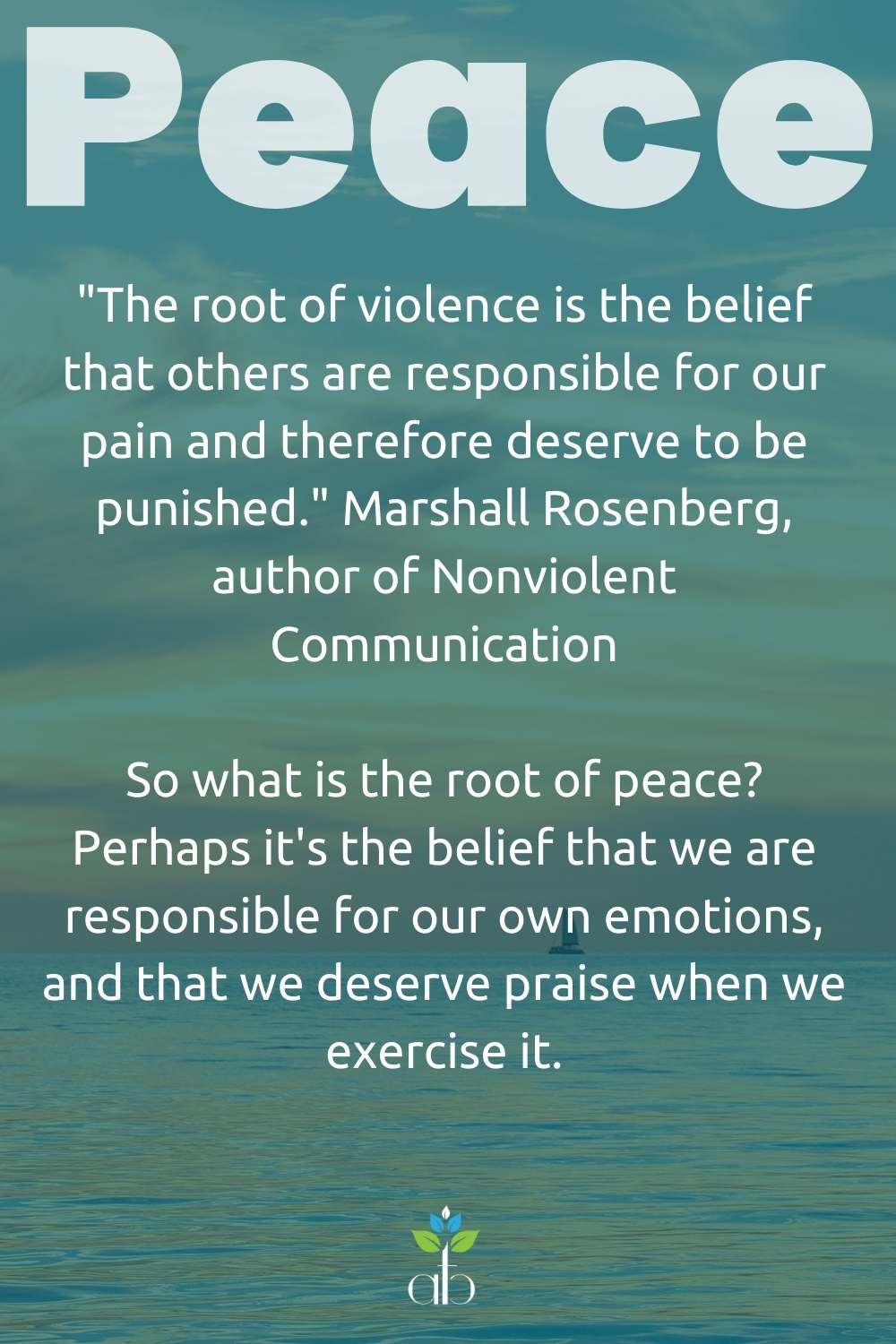Episode 205
The Root of Peace

“The root of violence is the belief that others are responsible for our pain and therefore deserve to be punished.” Marshall Rosenberg, author of Nonviolent Communication
So what is the root of peace? Perhaps it’s the belief that we are responsible for our own emotions, and that we deserve praise when we exercise it.
By using the techniques that Marshall Rosenberg explains in his book, we can learn to express our emotions in a way that doesn’t blame others, taking responsibility for our pain, our emotions and our experience of life.
Many times when we express our emotions in a descriptive way, explain our needs and make a reasonable request of others, they will be happy to do so, and they’ll even feel more comfortable expressing their own emotions in a healthy way, creating frictionless communication and more peace in the world.
Hosts & Guests
Kurt Robinson
Transcript
Let’s talk about the root of peace.
When I did that interview the other day with Eze Sanchez he told me that the particular quote from Marshall Rosenburg, who is the founder of Non-violent communication and several books on the topic…
Eze says in the quote is one that he uses in marketing that resonates with him and his audience. The quote is: The root of violence is the belief that others are responsible for our pain and therefore deserve to be punished.
And thinking about that also I like to phrase things positively as I talked about in a previous episode.
So I think about the root of violence is this belief, so what’s the root of peace?
I imagine trying to extract the corollary or verse of this rule, the root of peace perhaps is the belief that we are responsible for our own pain and suffering. That we don’t deserve to be punished I suppose.
Of course if its true, if the root of peace is that we are responsible for our own suffering then it leads to the idea that perhaps we are also responsible for peace in the world. Responsible for our own peace and the peace around us, to an extent.
I don’t know exactly what extent that it goes but it’s an interesting idea to play with.
So of course with the ideas of nonviolent communication, I’m no expert but I know a few of the ideas.
Once I have tried to apply it, quite practical this idea. I think they call it an I statement so it’s a statement like when this happens, I feel a certain way.
An example that comes up in my mind from years ago when I was studying sound production. When a band member arrives late I feel frustrated and as a result it delays our process.
What I need, the key thing, I have this need for stability, consistency. I have this need to know you are committed to the practice.
In the future I humbly request you do your best to arrive on time. It’s not putting the blame of emotions on the other person. It’s not saying you made me angry.
I think there’s this quote attributed to Eleanor Rosevelt “nobody can walk over you unless you are lying down.”
That is to say no one can make you feel a certain way, no one has that power. You have control over your sovereign soul, if you believe that.
If you don’t believe that you might get pushed around like leaves in the wind. If you decide you are sovereign you can gain that ability which is pretty exciting if you think about it.
At first it might seem alarming because you think “oh no, I have to take responsibility!”
Responsibility and power are so interwoven that when someone says be responsible they’re also saying be powerful.
If we talk about responsibility for our own emotions we talk about power over our own emotions. The power of peace, of love, of happiness. The power of creating something wonderful within ourselves and spreading it to the environment and giving the gift of our presence just by being there.
Now think about these I statements because if you deliver them by the book according to the formula sometimes it can come out quite robotic.
For example, I talk about I used to spend a lot of time arguing with people online. I know for some it can be a bad habit or a vice. It can cause a lot of unnecessary adverse emotions.
I was thinking about when I wasn’t arguing I was doing something else. I was trying to be human with people.
So say online having a debate and someone doesn’t agree with me and they start calling me names. Like they start calling me right wing hack or bleeding heart leftie cappuccino sipping Northcote hipster. People call me all kinds of things which is kind of funny.
And I could respond in kind with name calling. I could also say “I must admit when I read your comment, the things you said about me I felt a little frustrated. Now I do think it’s conducive to productive conversation to have some respect for each other and to keep the disagreements on the subject matter rather than make it personal. I think it’s gonna be more enjoyable for you and me in the future. So what do you say? Keep it a little more impersonal, avoid name calling and avoid the subject matter. What do you think?”
Sometimes people would mock me saying “what are you trying to be nice?”
Other times, a lot of the time, they’d say, you are right. I forgot there’s a person on the other side. I don’t wanna behave like that. What you’re saying is amicable and I want to be like that. Maybe they would apologize.
It’s so amazing when you give people just an inkling of a model and they can be a bit more human, many times they will take you up on that offer and offer you peace in kind.
What is the root of all peace? You can find out for yourself and tell me if you have some insights.
Thank you for being responsible for your emotions and for being powerful with your emotions and other people and joining together if you can and being respectful and for finding ways to acknowledge other people’s humanness.

New Episodes Every Weekday
11am Mexico City time
10 min episodes Monday - Thursday
1 h interview episode on Fridays
As an Amazon Associate I earn from qualifying purchases.
Stay Beautiful &
Stay Connected
